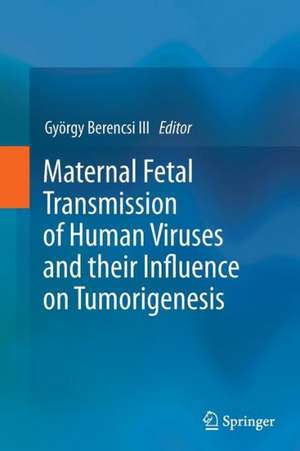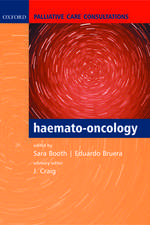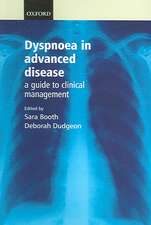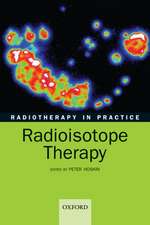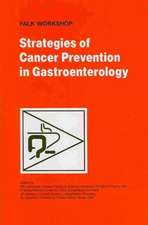Maternal Fetal Transmission of Human Viruses and their Influence on Tumorigenesis
Editat de György Berencsi IIIen Limba Engleză Paperback – 9 mai 2014
| Toate formatele și edițiile | Preț | Express |
|---|---|---|
| Paperback (1) | 1103.95 lei 6-8 săpt. | |
| SPRINGER NETHERLANDS – 9 mai 2014 | 1103.95 lei 6-8 săpt. | |
| Hardback (1) | 1111.09 lei 6-8 săpt. | |
| SPRINGER NETHERLANDS – 7 apr 2012 | 1111.09 lei 6-8 săpt. |
Preț: 1103.95 lei
Preț vechi: 1162.06 lei
-5% Nou
Puncte Express: 1656
Preț estimativ în valută:
211.26€ • 229.40$ • 177.46£
211.26€ • 229.40$ • 177.46£
Carte tipărită la comandă
Livrare economică 23 aprilie-07 mai
Preluare comenzi: 021 569.72.76
Specificații
ISBN-13: 9789401782494
ISBN-10: 9401782490
Pagini: 472
Ilustrații: VIII, 464 p.
Dimensiuni: 155 x 235 x 25 mm
Greutate: 0.66 kg
Ediția:2012
Editura: SPRINGER NETHERLANDS
Colecția Springer
Locul publicării:Dordrecht, Netherlands
ISBN-10: 9401782490
Pagini: 472
Ilustrații: VIII, 464 p.
Dimensiuni: 155 x 235 x 25 mm
Greutate: 0.66 kg
Ediția:2012
Editura: SPRINGER NETHERLANDS
Colecția Springer
Locul publicării:Dordrecht, Netherlands
Public țintă
ResearchCuprins
1. Barriers of the human organism and their Achilles’ heels. - 2. Recent results on the development of fetal immune system: Self, epigenetic regulation, fetal immune responses. - 3. The role of endogenous retroviruses in the formation of syncytiotrophoblast and materno-fetal barrier. - 4. Maternal-fetal infections with human viruses. - 5. The mechanism and significance of integration and vertical transmission of human herpesvirus 6 genome. - 6. Maternal-fetal transmission of HBV. - 7. Function of maternal idiotypic and anti-idiotypic antibodies as transgenerational messengers. - 8. Polarised transfer of proteins through the syncytiotrophobalst and tissue culture cell lines. - 9. Fetal and neonatal illnesses caused or influenced by maternal transplacental IgG and/or therapeutic antibodies applied during pregnancy. - 10. Maternal-fetal microchimerism and fetal-juvenile malignancies. - 11. Maternal tumours associated with and influenced by pregnancy.
Recenzii
From the reviews:
“This volume written by virology experts reviews in addition to the maternal-fetal interaction of human viruses, with emphasis on those which influence the development and tumorigenesis in the fetus and neonate. Of interest to virologists, obstetricians, neonatologists, immunologists and oncologists. A timely text.” (Pediatric Endocrinology Reviews (PER), Vol. 10 (2), January, 2013)
“This volume written by virology experts reviews in addition to the maternal-fetal interaction of human viruses, with emphasis on those which influence the development and tumorigenesis in the fetus and neonate. Of interest to virologists, obstetricians, neonatologists, immunologists and oncologists. A timely text.” (Pediatric Endocrinology Reviews (PER), Vol. 10 (2), January, 2013)
Textul de pe ultima copertă
The human foetus is separated from the maternal blood by the syncytiotrophoblast induced by endogeneous human retrovirus-encoded proteins. This barrier is a highly developed one, which suppors apical-basolateral transport of maternal idiotype and anti-idiotype IgG, IgG-virus complexes.
The selective maternal-fetal transport of epitope- and paratope-bearing entities can influence the developping fetal immune system during pregnancy.
The bidirectional maternal-fetal transfer of cells are of even more importance during pregnancy. Maternal cells with latent viruses transport viruses without impairment of fetal development. Cells with premaligant and malignant genetic transformation are also transported to the fetus. Fetal and neonatal tumours are initiated by such cells in spite of the antitumour potential of fetal organism. On the contary, the fetal cells repair maternal tissue injouries and survive in the organisms of the recipients for decades. These possess new consequences for the neonatal immunity and organ transplatation surgery.
The selective maternal-fetal transport of epitope- and paratope-bearing entities can influence the developping fetal immune system during pregnancy.
The bidirectional maternal-fetal transfer of cells are of even more importance during pregnancy. Maternal cells with latent viruses transport viruses without impairment of fetal development. Cells with premaligant and malignant genetic transformation are also transported to the fetus. Fetal and neonatal tumours are initiated by such cells in spite of the antitumour potential of fetal organism. On the contary, the fetal cells repair maternal tissue injouries and survive in the organisms of the recipients for decades. These possess new consequences for the neonatal immunity and organ transplatation surgery.
Caracteristici
Bidirectional maternal-fetal transport during pregnancy and long-term survival of cells Fetal illnesses caused by receptor mediated maternal-fetal transport of autoimmune IgG Receptor mediated transport of maternal anti-idiotypes may induce fetal TREG cells and fetal IgM Biological therapy of malignancies of pregnants (monoclonal abs) may cause fetal impairment Virus transport to the fetal body might result in later impairment of tumour defence mechanisms
